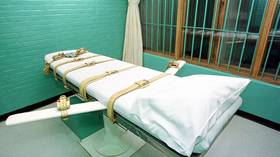Convicted killer escapes execution in US

The state of Alabama was forced to cancel the execution of a convicted hit-man when their executioners were unable to find a suitable vein to administer the lethal injection before the midnight deadline on Thursday. It is the second execution the state has had to abandon due to difficulties with the intravenous (IV) setup in just three months.
Prison staff at the William C. Holman Correctional Facility in Altmore spent an hour trying to connect the two IV lines required for lethal injection to the veins of killer-for-hire Kenneth Eugene Smith. While they ultimately succeeded in placing one line, they were unable to situate the other before the clock struck midnight and the execution warrant for the 57-year-old expired.
Smith was sentenced to death in 1996 for murdering Elizabeth Sennett in exchange for a $1,000 payout from her preacher husband, Charles Sennett, who was deep in debt and hoping to collect on insurance money. At his trial, Smith admitted that it was “agreed for [co-defendant] John [Forrest Parker] and I to do the murder” and that he had taken items from the house to make the killing look like a burglary.
However, Smith claimed that while he participated in the attack, he had not intended to kill Sennett, who died with eight stab wounds to her chest and two to her neck. Parker, who also received $1,000 for his part in the killing, was executed in 2010.
While the Supreme Court denied Smith’s request for a stay of execution on Wednesday, the 11th US Circuit Court of Appeals issued one on Thursday, shortly before what was scheduled to be a 6pm execution – only for the Supreme Court to lift that stay, leaving officials with little time to carry out the killing before the death warrant expired at midnight. The state must now return to court to obtain a new execution date.
In September, Alabama had to postpone the execution of Alan Miller after prison staff were unable to insert an IV for nearly two hours despite repeated jabs into his arms, hands and feet. In July, the state’s execution of Joe Nathan James took more than three hours, one of the longest in history, leaving the prisoner with his arm cut open and with multiple puncture wounds in violation of execution protocols.
Alabama abolished the death penalty in 2017, but the decision did not affect existing sentences.













